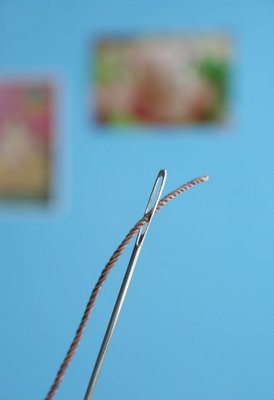In praise of DSLRs (as if they needed it)
There are good reasons why the press switched to digital years ago and they all hit me in the face last week. Film is expensive, doesn’t allow you to check your pics until it’s too late, each roll of film requires two trips to the lab plus scanning (since I do that myself), and the result is much better than what is needed in but the best of glossy magazines. Everybody knows this but sometimes you just need to figure things out for yourself.
Actually, I didn’t really suffer from the “can’t check until it’s too late problem” apart from the stress it induces. I’ve been using my Mamiya 645e and then Mamiya Pro TL for 6 months now so I sort of know what I’m doing. That’s not a bad talent when you switch to digital because small crappy LCD screens are not to be trusted. Besides, looking at your LCD too much distracts you from what you should really be looking at, the real world.
Still, I really need to buy a digital camera to be fast enough in my work. I wasn’t too thrilled about this because I already own a Sony DSC-P200 (a compact) and have a Panasonic DMC-FZ30 at work, a superzoom that goes up to 420mm in 35mm equivalent. But I don't like either camera and figured only a DSLR could do the trick. This was a bit of a wild guess. Since nobody bothers to “cross-compare” cameras, I didn’t really know what to expect from the switch to a digital single-lens reflex (DSLR) except that as a “sorta pro” a DSLR was what I was supposed to get. Many stress how DSLRs rock at focusing and how they offer better control over all the functions that go into digital camera. But I think I never read anything like, “The image quality is ten times better than non-DSLRs—-the noise, the sharpness, the colors—everything will leave you amazed.”
I guess nobody bothers to compare cameras across categories because they expect people to know which category they’re shopping in and just need to know which camera is best in that given category. But I can think of a few people who hesitated or still hesitate between advanced compacts or megazooms and DSLRs--and even people waiting to make the switch from 35mm. So let’s just make this clear one more time, a DSLR, even with 6MP, will blow away any compact, even those with 8MP.
The fact people shop around for high megapixel counts is called the “megapixel myth”. The truth is that increase in megapixels is not as important as it seems because doubling the amount of pixels only increases resolution by half. What does matter is your sensor's size.
Bigger sensor’s have lower noise and do a generally better job at capturing sharp, colorful images. Sensors go from tiny (6mm on your mobile phone) to medium-format sized (6cm x 4,5cm, not in any normal human’s budget though). Most affordable DSLRs are 1.6 (Canon) or 1.5 (Nikon) times smaller than the traditional 35mm negative (24mm by 36mm), which gives us something like 15mm x 24mm. For comparison the aforementioned Sony and Panasonic cameras are a full 10mm less wide than that.
No, I’m not going to do test shots. I’m just telling you that if you like photography enough to have read this far, you should go out and buy a DSLR if you haven’t already. They really make better pictures, period.
Well except that if I were you, I’d wait a couple months. The Sony Alpha A (hitting shelves now) packs some nice goodies but I’m very suspicious of Sony as they are new to SLRs (even if they're building on the Minolta brand that they acquired earlier this year). Lets wait for its full review on dpreview.com. Nikon’s response will be a new, I guess, entry-level DSLR to be announced in 10 days. And Canon’s own 350d is getting very old now as well (over 18 months, the usual life cycle of a DSLR). Canon will have to reply to Nikon and Sony ASAP. Expect a new Canon entry-level DSLR before the end of the year.
Too bad, I needed one right NOW. If you’re in that case, and depending on your budget, you should get a Nikon D200 or the much lighter and cheaper Canon 350D. Choosing one means you might have to stick with either brand for life though, as the flashes and lenses you buy will not operate across brands—another reason to think very hard before buying into any DSLR brand, and Sony in particular.
I read pages and pages of reviews, went to Canon and Nikon dealers to play with all their cameras and finally I got the 350d, second-hand with a 1GB compactflash, for 26 000 baht (that’s about 520 euros). I liked how ridiculously light it is, even if yes, the grip is a bit small which is not very comfortable and doesn’t look very pro either. I haul my gear around, with a tripod, all day long, so I don’t think a nice heavy feel in my hands is cool at all. Heavy busts my back. So far, I’m very satisfied with controls, focus, and speed of operation. The d200 will get you big improvements in those areas (but not really in image quality) and also a fantastic LCD (bigger, brighter, crisper).
With all the money I saved by buying the cheapest DSLR around, I can get stuff which is much more important to getting good pictures than the camera’s body: flashes and lenses mostly. The other good thing about getting a cheap DSLR is that you get a crap kit lens. Well that’s a good thing and a bad thing because those lenses are really a waste of plastic and glass but it means I don’t even have to get a lens right away. The kit lens is definitely good enough for my magazine. In Europe and the US you can always get body only versions of even the entry-level DSLRs anyway, not here in Thailand.
Here are my very first pics: Shan, a Chinese Restaurant on Thanon Thonglor that was absolutely delicious and reconciled me, at long last, with Chinese cuisine; and what may well be the next cover of BK Magazine, but then again, might not.




Actually, I didn’t really suffer from the “can’t check until it’s too late problem” apart from the stress it induces. I’ve been using my Mamiya 645e and then Mamiya Pro TL for 6 months now so I sort of know what I’m doing. That’s not a bad talent when you switch to digital because small crappy LCD screens are not to be trusted. Besides, looking at your LCD too much distracts you from what you should really be looking at, the real world.
Still, I really need to buy a digital camera to be fast enough in my work. I wasn’t too thrilled about this because I already own a Sony DSC-P200 (a compact) and have a Panasonic DMC-FZ30 at work, a superzoom that goes up to 420mm in 35mm equivalent. But I don't like either camera and figured only a DSLR could do the trick. This was a bit of a wild guess. Since nobody bothers to “cross-compare” cameras, I didn’t really know what to expect from the switch to a digital single-lens reflex (DSLR) except that as a “sorta pro” a DSLR was what I was supposed to get. Many stress how DSLRs rock at focusing and how they offer better control over all the functions that go into digital camera. But I think I never read anything like, “The image quality is ten times better than non-DSLRs—-the noise, the sharpness, the colors—everything will leave you amazed.”
I guess nobody bothers to compare cameras across categories because they expect people to know which category they’re shopping in and just need to know which camera is best in that given category. But I can think of a few people who hesitated or still hesitate between advanced compacts or megazooms and DSLRs--and even people waiting to make the switch from 35mm. So let’s just make this clear one more time, a DSLR, even with 6MP, will blow away any compact, even those with 8MP.
The fact people shop around for high megapixel counts is called the “megapixel myth”. The truth is that increase in megapixels is not as important as it seems because doubling the amount of pixels only increases resolution by half. What does matter is your sensor's size.
Bigger sensor’s have lower noise and do a generally better job at capturing sharp, colorful images. Sensors go from tiny (6mm on your mobile phone) to medium-format sized (6cm x 4,5cm, not in any normal human’s budget though). Most affordable DSLRs are 1.6 (Canon) or 1.5 (Nikon) times smaller than the traditional 35mm negative (24mm by 36mm), which gives us something like 15mm x 24mm. For comparison the aforementioned Sony and Panasonic cameras are a full 10mm less wide than that.
No, I’m not going to do test shots. I’m just telling you that if you like photography enough to have read this far, you should go out and buy a DSLR if you haven’t already. They really make better pictures, period.
Well except that if I were you, I’d wait a couple months. The Sony Alpha A (hitting shelves now) packs some nice goodies but I’m very suspicious of Sony as they are new to SLRs (even if they're building on the Minolta brand that they acquired earlier this year). Lets wait for its full review on dpreview.com. Nikon’s response will be a new, I guess, entry-level DSLR to be announced in 10 days. And Canon’s own 350d is getting very old now as well (over 18 months, the usual life cycle of a DSLR). Canon will have to reply to Nikon and Sony ASAP. Expect a new Canon entry-level DSLR before the end of the year.
Too bad, I needed one right NOW. If you’re in that case, and depending on your budget, you should get a Nikon D200 or the much lighter and cheaper Canon 350D. Choosing one means you might have to stick with either brand for life though, as the flashes and lenses you buy will not operate across brands—another reason to think very hard before buying into any DSLR brand, and Sony in particular.
I read pages and pages of reviews, went to Canon and Nikon dealers to play with all their cameras and finally I got the 350d, second-hand with a 1GB compactflash, for 26 000 baht (that’s about 520 euros). I liked how ridiculously light it is, even if yes, the grip is a bit small which is not very comfortable and doesn’t look very pro either. I haul my gear around, with a tripod, all day long, so I don’t think a nice heavy feel in my hands is cool at all. Heavy busts my back. So far, I’m very satisfied with controls, focus, and speed of operation. The d200 will get you big improvements in those areas (but not really in image quality) and also a fantastic LCD (bigger, brighter, crisper).
With all the money I saved by buying the cheapest DSLR around, I can get stuff which is much more important to getting good pictures than the camera’s body: flashes and lenses mostly. The other good thing about getting a cheap DSLR is that you get a crap kit lens. Well that’s a good thing and a bad thing because those lenses are really a waste of plastic and glass but it means I don’t even have to get a lens right away. The kit lens is definitely good enough for my magazine. In Europe and the US you can always get body only versions of even the entry-level DSLRs anyway, not here in Thailand.
Here are my very first pics: Shan, a Chinese Restaurant on Thanon Thonglor that was absolutely delicious and reconciled me, at long last, with Chinese cuisine; and what may well be the next cover of BK Magazine, but then again, might not.





5 Comments:
Hi there,
Just came across your site for the first time. I'm also a BKK-based photographer. I do a lot of food and travel stuff and have a blog (http://realthai.blogspot.com/) and a badly-in-need-of-updating website (www.austinbushphotography.com). I've been using the D100 for years now and am currently waiting for my recently-ordered D200 to arrive! I actually prefer film, but due to the costs of film and developing, I've hardly touched my film camera in three years. It's also nice to be able to see your pics as soon as you take them. I, for one, will be using DSLRs for a long time, and look forward to seeing them progress!
Cheers,
Austin
the last pic is perfect!
At last!
Pictures from the DSLR :-)
Here's to seeing your work on that cover...
Good shots!
You probably already know about it but dpreview is a good on-line product review site.
Regarding the "megapixel myth," there are some calculations about pixels and print sizes here.
Thanks for the tip but there's a link to dpreview in this very post!
As for the second link, it misses the point I was trying to make, that 8 million sharp DSLR pixels don't equate to 8MP out of a compact. In other words, that chart is only true in some abstract mathematical way, not in real life.
Post a Comment
<< Home